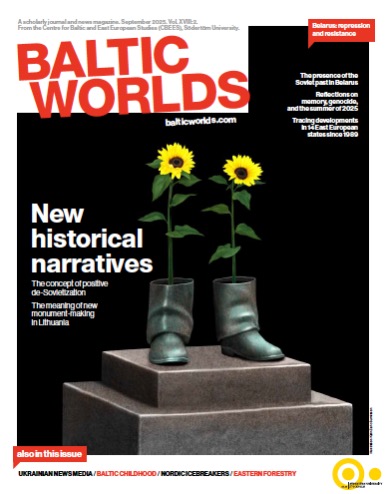
Alesia Rudnik. PHOTO: Euroradio
Okategoriserade Doctoral Thesis. Review Series 2025:1 ”Digital spaces are often the only venues where dissent and mobilization can take place”
Alesia Rudnik is a political scientist based in Sweden, originally from Belarus. Her research has been published in journals such as Europe-Asia Studies, Communist and Post-Communist Studies, Media, War & Conflict and Internet Policy Review. She is also a regular contributor to Baltic Worlds (see for example the co-authored article with Malin Rönnblom in BW, vol. 17, no. 4, 2024). She currently serves as the Director of the Center for New Ideas, an independent Belarusian think tank operating in exile. She previously led a Belarusian diaspora organization in Sweden and was awarded “European of the Year 2022” in Sweden for her civic engagement. Rudnik’s academic work focuses on the relationship between people and technology in the context of political protests under authoritarian regimes. On September 12, 2025, she defended her doctoral dissertation in political science at Karlstad University, titled Machinery of Dissent: People and Technology in Political Protests in Autocracies. In conversation with Baltic Worlds, Dr. Rudnik reflects on research in Sweden concerning Belarus, the 2020 Belarusian protests, and the role of digital platforms in mobilizing protest movements within authoritarian contexts.
Published on balticworlds.com on October 6, 2025
Alesia Rudnik is a political scientist based in Sweden, originally from Belarus. Her research has been published in journals such as Europe-Asia Studies, Communist and Post-Communist Studies, Media, War & Conflict and Internet Policy Review. She is also a regular contributor to Baltic Worlds (see for example the co-authored article with Malin Rönnblom in BW, vol. 17, no. 4, 2024). She currently serves as the Director of the Center for New Ideas, an independent Belarusian think tank operating in exile. She previously led a Belarusian diaspora organization in Sweden and was awarded “European of the Year 2022” in Sweden for her civic engagement.
Rudnik’s academic work focuses on the relationship between people and technology in the context of political protests under authoritarian regimes. On September 12, 2025, she defended her doctoral dissertation in political science at Karlstad University, titled Machinery of Dissent: People and Technology in Political Protests in Autocracies. In conversation with Baltic Worlds, Dr. Rudnik reflects on research in Sweden concerning Belarus, the 2020 Belarusian protests, and the role of digital platforms in mobilizing protest movements within authoritarian contexts.
Joakim Ekman (JE): How does it feel to have completed your PhD – what was the first thing you did after the defence?
Alesia Rudnik (AR): It feels like a chapter of my life has come to a close. Earning a PhD in political science was a goal I set for myself back in my teenage years, so reaching this milestone feels like both a personal accomplishment and a fulfilment of a long-standing promise to my younger self. After the defence, I celebrated with colleagues during a warm and memorable evening that included a quiz based on my dissertation, a musical performance by one of my peers, and heartfelt speeches. It was a cozy, joy-filled night. To top it off, I took a one-week trip to Italy – a perfect way to mark the end of this journey.
JE: Could you briefly summarize what your dissertation is about?
AR: The dissertation is an analysis of how digital technology is incorporated into contemporary political protests in autocracies. As empirical groundwork, I briefly analysed how TikTok emerged as a mobilization platform in Russia in 2021. However, the main empirical focus of the dissertation is the exploration of the relationship between technology and people during the Belarusian protests of 2020.
The theoretical argument of the dissertation is that the technological and physical lives of modern individuals are so deeply intertwined that separating the two dimensions no longer reflects the reality we live in. For citizens of non-democratic states, where alternative opinions are censored, digital spaces are often the only venues where dissent and mobilization can take place. The inseparability of the technological and physical in these contexts, particularly during political crises, creates conditions for rapid mobilization and online unrest. I metaphorically refer to this alliance of people and technology as a “machinery of dissent”.
Scholarly knowledge on the role of technology in social movements has largely grown from studies of platforms such as Facebook and Twitter. In practice, however, many recent protests have been mobilized via TikTok, Telegram, or – as seen very recently – the gaming platform Discord. It is therefore important for academia not only to keep pace with the use of new platforms in protest mobilization, but also to build a strong theoretical foundation that expands upon earlier scholarship rooted in platforms that are now relatively marginal in this context.
Practice shows that movements learn from one another – something illustrated by Discord becoming a mobilization platform in Morocco just weeks after it was used during the protests in Nepal (in the fall of 2025). Thus, my dissertation goes beyond the Belarusian and Russian cases; it is about the broader strategies social movements use around the world.
JE: Your perspective is innovative. What inspired your approach?
AR: I was inspired by approaches in science and technology studies (STS), where similar arguments form the basis of many research inquiries. In a sense, modern digitalized social movements are chaotic and networked, an inherently fitting framing through the lens of STS. Thus, the readings, specific scholars, and, not least, my observations of the unfolding Belarusian protests (which began on the same day as my PhD) all inspired my approach.
JE: What sources and materials did you work with, and how did you access them?
AR: Two main sources were used in the dissertation. Firstly, I analysed protest videos in Russia on TikTok, using the most popular hashtags related to the protests against the detention of Aleksei Navalny in 2021. Similarly, I examined publications in the largest Telegram channel, Nexta, in Belarus, which played a key role in mobilizing the protests. Both sources were easily accessible, as I monitored them almost in real time. However, many of the analysed TikTok videos were later removed by the platform, following requests from the Russian government.
Secondly, I conducted interviews with protest leaders, participants, and digital activists from Belarus. At the time of the interviews, all of them had left the country. To meet them, I travelled to Vilnius, Warsaw, and Berlin. In the methods section of the dissertation, I note that being Belarusian, having a public profile, and possessing prior activism experience helped me secure interviews with individuals who might otherwise be reluctant to speak with strangers or outsiders. Studying social movements is more effective when respondents trust the researcher; something for which I am deeply grateful.
JE: Did you encounter any specific ethical or practical challenges in your work?
AR: Some of the interviews were challenging. Sometimes the respondents had to change locations at the last minute for security reasons. But the biggest challenge was probably the psychological weight of these interviews: many traumas and difficult experiences were shared by the respondents. At times, I felt I simply had to be present as a form of support, even though I knew this might not yield material for the analysis. In turn, many of the observations made in those moments turned out to be the most valuable.
JE: How did the political situation in Belarus affect your ability to conduct research?
AR: First, it limited my focus to respondents currently residing outside of the country. Second, the closed nature of the Belarusian regime did not allow for an equally in-depth study of the regime’s role in suppressing the protests compared to the study of protest participants.
JE: The opponent at your doctoral defence was from outside of Sweden (Mariëlle Wijermar, Assistant Professor in Internet Governance, Maastricht University). How would you describe the academic interest in Belarus in Sweden?
AR: I would describe it in two words: marginal and Russia-embedded.
JE: Has the ongoing war in Ukraine changed anything in this regard?
AR: On the one hand, following the surge of interest in Belarus in 2020-2021, the war in Ukraine has continued to influence the de-Russification (or, as some would frame it, decolonization) of Eastern European studies. On the other hand, the expanding field of Ukraine studies has naturally led to a decline in attention to the Belarus agenda, after 2022. In this regard, academia has mirrored the trajectories of politics and media.
JE: In what ways could Swedish research strengthen its focus on authoritarian regimes and post-Soviet countries?
AR: There are great initiatives addressing this in Sweden at the moment. However, I would encourage more collaborations to strengthen the practice of learning from scholars of authoritarianism to study potential crises within democratic systems – including the roles of Big Tech and welfare in democratic countries. I believe that many research strands within authoritarianism studies have now become a valuable source for anticipating democratic backsliding. Some developments that appear novel in struggling democracies are already well-established practices in autocracies. Building collaborations along these lines would help both to understand the challenges to democracy from a theoretical perspective and to address them at the political level.
JE: You are not just a researcher; you have also been involved in political activism. Are there any activist-oriented projects or initiatives you’re interested in pursuing?
AR: I formally left political activism in 2021, when I concluded my chairwomanship at Sveriges Belarusier. For now on, while applying for post-doctoral positions, I will still keep working with the independent Belarusian think tank in exile (Center for New Ideas), which I led as a Director since September 2023. In a broad sense, sure; this can be seen as activism, as we are working towards educating young Belarusians in exile, publishing research on topics not welcomed by the ruling elites, and providing recommendations to Western stakeholders working with Belarus.
I don’t believe that engaging in political research should necessarily preclude participation in political activism. Even if research adheres to rigorous academic standards, the very act of framing research findings involves a degree of political agency. That, however, is a separate issue worthy of its own reflection.
JE: Do you plan to stay in academia, or are you considering applying your expertise in other fields?
AR: I believe that research should have real-world impact. Throughout my thesis work and beyond, my guiding principle has been to consider its applicability: Can it benefit the communities being studied? Can it inform policymakers or engaged citizens? With this in mind, I see myself contributing to research both within and beyond academia; something I have consistently done throughout my time as a PhD student. I hope to carry this approach forward in my career: striving for high-quality research while also offering insights and expertise to relevant stakeholders outside of academia.
JE: Thank you for the conversation.

 Issue 2025, 2:
Issue 2025, 2: 







